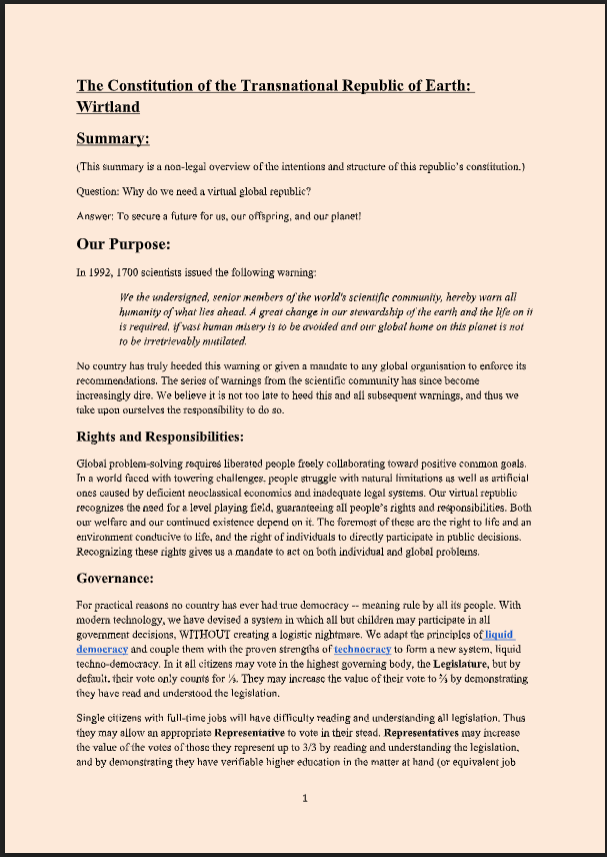The views expressed in the following article are not necessarily those of the Times of Wirtland.
Summary
I (Stephen Reid) will show how Wirtland requires innovation to avoid becoming a footnote in digital history. I will then compare two competing visions for Wirtland’s future.
Vision 1: In 2010 Wirtland’s owners wrote here about acquiring land from a cash-strapped country as sovereign territory for our virtual state, transforming it into a physical state. The people of Wirtland would buy this land from a donor country at USD 1000/square meter. With territory of its own, Wirtland can gain international recognition as a country in accordance with the Montevideo Convention. This would generate much-needed publicity and attract citizens. Economic and political growth would follow.
I will examine the difficulties with implementing this plan and the challenge in proving Wirtland has permanent residents (a requirement for recognition). Economic and political growth reflect citizens’ trust in their country, and thus far this plan hasn’t improved on it.
Vision 2: I have proposed to Wirtland’s leaders that they endow Witizens (citizens of Wirtland) with self-rule and legally recognized human rights, and create the basis for a real economy which doesn’t disadvantage the world’s poor and middle classes. Recognizing Witizens rights (and by extension those of all people) and giving them democracy is vital. It will attract those who lack them in their country of residence. Wirtland can then set up a trust fund through a fundraising foundation, allowing Witizens to deposit (and withdraw) money which is guaranteed to retain its buying-power. This will lay a cornerstone for economic freedom and will be the first step toward setting up a virtual national bank with a unique currency. These are keys to an independent economy based on proven ethical and trust-building principles. Witizens faith in Wirtland will grow, as will its population and political clout.
This vision involves significantly smaller challenges than the first one.
Article
In 2008, Wirtland was the first virtual state, but it is no longer the foremost. A space-bound competitor, founded in 2016, now has over 1,000,000 registered citizens. If we fail to create a raison d’etre -- something at which we can excel -- and a bold but realistic strategy for Wirtland’s future we will dwindle and end up in a dusty corner of the internet. [Achooo!] We might already be there.
So how do we
give Wirtland a meaningful purpose? Let’s compare a couple of options. I
authored the second one, so please nuance it with critical comments.
The “quantum leap” growth method
This requires a big event and an external player for Wirtland’s explosive growth.
Wirtland’s leadership exemplifies this method through its intention to acquire land. The argument, first put forward in 2010, is as follows:
Wirtland’s leaders want Wirtland to be recognized as a sovereign state, gaining publicity and attracting citizens. For this they must follow the Montevideo Convention (which defines a country). Wirtland must therefore fulfill the following requirements:
“a. a
permanent population;
b. a
defined territory;
c. government;
and
d. capacity to enter into relations with the other states.”
It’s doubtful Wirtland’s present three owners constitute a government in the eyes of the Montevideo convention’s signatories to fulfill requirement “c” . Maybe they do, maybe not. That’s anyone’s guess.
Wirtland’s leadership is planning an agreement with a desperate host country (fulfilling requirement “d”), whereby the host grants Wirtland a small parcel of unusable land in exchange for money (fulfilling requirement “b”). Nauru (known for environmental degradation and money-laundering) has been mentioned as a possible host. Wirtland will sell a parcel of the host’s worthless land to Wirtland’s citizens for USD 1000/ square meter, giving much of the profits to the host. That country stands to gain up to USD 10 million for a single hectare of unusable land, and Wirtland gets physical territory it can call its own. It sounds like a great deal for both parties.
After achieving all this, however, Wirtland must still demonstrate it has a permanent population in its newly-acquired territory. The land is useless, so we’ll assume it lacks infrastructure, roads from the host country, drinkable water, farmable land, usable or sellable resources etc. It might also contain hazardous waste. To permanently live there would therefore require an expensive effort by dedicated individuals which Wirtland must finance. Anyone interested?
At least one house must be built on this territory to demonstrate permanence. And since Wirtland is a virtual state, its residents require internet access (either a land-line extended from the host country or a satellite link). Unless the land deal includes a road, rail, or sea link, everything must be carried in on the backs of its residents, including building materials, food, clothes, water if sufficient amounts can’t be collected from rain, waste disposal and sewage treatment plants, a generator and fuel (unless power lines can be drawn from the host country), personal items, and all the other necessities of life. Also, t+h-e land used for this residency project would be privately owned by Witizens who paid extravagant prices for it. They may all want rent.
To demonstrate permanent residency and fulfill the first requirement of the Montevideo Convention, the residents of Wirtland’s territory must live there at least until the convention is satisfied. That could take years. Each trip outside the single hectare of Wirtland territory might require a visa. A prison term might be preferable. Still no volunteers?
Any country in dire enough economic straits to sell a part of itself is probably unstable. What then keeps that host country from reneging on its deal or placing export duties on items entering Wirtland’s territory, especially when a new regime comes to power?
This might still be possible with dedicated believers and a wealthy sponsor who doesn’t mind throwing money at it, but it is still likely to fail on the it's primary premise. Plots of useless land must actually be sold for USD 1000/square meter. Most of this money would go straight into the pockets of an unstable and probably unreliable country’s leadership. That land might even be privately owned (as it is in Nauru) which requires buying it twice. Also, Nauru’s present laws prohibit foreigners from buying Nauru’s land.
Keep in mind that one square meter of Manhattan (the world’s most valuable property) is worth about USD 1200/square meter. Wirtland’s leadership claims this useless land can be almost as valuable as Manhattan’s, but they don’t say how, not even after 11 years. I take that to mean they have no idea. Neither have I.
An object’s price is generally based on its market value and the trust between the buyer and the seller. Witizens haven’t demonstrated sufficient trust to even finance the ongoing operations of their virtual state. They hesitate to invest in a dictatorship, no matter how benevolent, and let's be very clear, Wirtland is owned by three people who dictate its future, making it a dictatorship. Autocracy is effective for establishing a virtual state, but it’s a weak basis for creating trust. So the value of worthless land will likely remain close to worthless. I wouldn’t pay USD 1000 or even USD 10/square meter for it. I might pay a single dollar for a square meter, just to say I own land in Wirtland, but at that price, no host country will go through the hassle of making a complex agreement with Wirtland to exchange sovereign territory for money.
Even if the scheme succeeds, the international community need not recognize a country that fulfills the Montevideo Convention’s requirements (Abkhazia and South Ossetia are examples). Wirtland may go through all the hassle, jump through all the hoops, and still not reach its goal.
However, the Montevideo Convention states that:
“Even before recognition the state has the right to defend its integrity and independence, to provide for its conservation and prosperity, and consequently to organize itself as it sees fit, to legislate upon its interests, administer its services, and to define the jurisdiction and competence of its courts.”
Wirtland could claim it has a defined (albeit disputed) territory consisting of planet Earth with a population of over 7 billion and a government (if the leadership forms one).It then only needs the capacity to enter into some sort of relation with another state, possibly a mikro-state like Liberland or the Principality of Seborga. It needs only to recognize the authority of the Montevideo Convention to motivate its existence and claim legal protection of its interests. Why seek some illusive international recognition if it already has the legal right to exist without formal recognition? All recognized countries have accepted the Montevideo Convention as part of customary international law. This is important since it gives an unrecognized state, like Wirtland, legal rights which can be defended in any country’s courts, with the burden of proof lying on the other party.
Land acquisition is, in my view, unnecessary and likely to fail. Wirtland has floundered during the 11 years its leadership has entertained this notion. It’s time for change.
I encourage anyone with alternative views to comment or write an article and send it to Wirtland’s leadership here.
The organic growth method
Another possible future for our virtual state involves growth by steps using available resources. Wirtland has attempted this, but hasn’t allowed citizens rights or created an economy. Thus Witizens’ trust dwindled, and Wirtland’s initial success ended.
Using one’s strengths makes progress easier than struggling with one’s weaknesses. The previous method battles the weakness of Wirtland’s lack of international recognition,making progress difficult. We should highlight Wirtland’s strengths and only address its failings when they hinder progress.
We must, however, address Witizens’ abysmal trust. At present it hinders growth. The leadership’s unilateral decision to sell Wirtland on Ebay (which you can read about here) was an enormous breach of that trust. If Wirtland is to be sold, or become a democracy, or disband, or whatever, it should be Witizens’ choice. To recreate trust, I believe Wirtland’s leadership must recognize Witizens’ rights, among which is their right to self-govern. Wirtland’s leaders may choose to deny Witizens rights, but without rights Witizens will not invest in Wirtland’s future, and the country will remain in its dusty corner of the internet.
Creating trust involves letting Witizens adopt a constitution (The Constitution of Wirtland), treating them with dignity, giving them responsibilities, democratic government, and the basis for a fair and independent economy. Economy is the key to Wirtland’s growth, but I’ll cover that later.
A physical state need not create a purpose for itself, since it already has a captive population in need of services. But a state like Wirtland must find something at which it can out-compete all others. I suggest that human rights can be such a purpose. Rather than seeing Wirtland as a virtual state, consider it a global state which only uses a virtual medium.
Hundreds of millions of people, possibly billions, lack essential rights. They live in countries that imprison homosexuals, treat women as second class citizens, brutally discriminate against religious groups and propagate systemic racism and subjugation of aboriginals and natives. Then there are all those whose economic rights are exploited by others. Most oppressed people cannot just switch countries, but many have mobile phones. Any internet-based state that stands in solidarity with disenfranchised people has a potential citizenship numbering in the billions!
If Wirtland chooses this course, the next step is laying the groundwork for a new economy. The world’s dominant neoclassical economic system disadvantages most people in favor of banks and the wealthiest 1%. If Wirtland establishes a system which even slightly favours the economic rights of the 99%, its potential becomes almost limitless. Remember, the Montevideo Convention gives a non-recognized state the right to “provide for its conservation and prosperity”. A global state, such as Wirtland, thus has the right to create a bank, a currency, and its own economic system if it is a prerequisite to providing such prosperity. I envision this as a two-step process requiring:
1. marketplaces in which to make fair
trades of goods and services and
2. a trusted currency with which to facilitate trade.
Economies, like virtual countries, are all about trust. Giving all Witizens valuable rights germinates seeds of trust that can be nurtured and grow into a viable economy. The first step requires setting up a non-profit Fundraising Foundation for Wirtland with an independent bank account.
The foundation creates a fund in which Witizens may freely deposit and withdraw money. The fund’s purpose is to ensure that the buying power of Witizens’ deposits don’t decrease over time, meaning any money they hold in the fund will increase in value at the rate of inflation. To do this, Wirtland’s government invests in diverse ethically-sound and successful businesses. Any profit exceeding inflation is invested in Wirtland’s development.
Wirtland, through its trust fund, has thereby established the economic right of zero inflation for Witizens’ money. It can then adopt a legitimate but competing model to the world’s dominant financial system, one which Christine Lagarde, the former head of the IMF, endorsed as more stable. This alternate model abolishes interest rates and requires that only real items be legal for sale. It therefore keeps loans from becoming oppressive and ensures that distorted financial derivatives like futures, options, shorts etc are abolished -- things the super-rich use to steal wealth from the less fortunate. That is an enormous step toward a fair economic playing field for Witizens. It will attract people and businesses in unstable countries to a fairer system in which the financially depressed can have faith.
Once Wirtland’s trust fund has generated sufficient capital, the national bank is set up with accounts for all Witizens. Any money invested in the trust fund is replicated in Witizens’ accounts as Wirtland’s own unique currency. Witizens retain the right to exchange it for foreign currency, a service for which the bank makes no profit, and zero inflation still applies, but Witizens may now also use Wirtland’s money in Wirtland’s free marketplaces.
These marketplaces charge nothing for the service, and allow Witizens to buy and sell goods and services meeting Wirtland’s ethical standards. The marketplaces will be web-based, requiring only programming. Anyone living in a country with high inflation will see the value of using Wirtland’s stable electronic currency over their own. As more Witizens exchange their currency for Wirtland’s, its trust fund grows, allowing more profitable investment.
I believe giving Witizens human rights, self-rule and a fairer economy creates a viable future. These things can be implemented incrementally starting now. They require no outside recognition or unreasonable financial investments. Witizens trust for Wirtland will be repaired and enable growth. In the end, the international recognition Wirtland’s leadership desires may be gained without selling worthless land at New York City prices.
Several donor organisations support democratization and human rights. Wirtland should seek additional project-assistance from them for programming and website development. I have personally contacted one, whose initial response was very positive.
Which method do you believe will provide the most hope for Wirtland’s future, the quantum leap or organic growth? Please write your reply in the comments.
Here are links to sites and documents where I am facilitating this organic growth.
Digital Democracy for
Global Change (a
Facebook group I founded)
The Constitution of
Wirtland (Start
with the introduction.)
Banking, Finance and Marketplaces (a foundation for a fair economy)
Your loyal
fellow Witizen,









5 comments:
That was a long article, and quite detailed. Fortunately Covid and working from home gives me more time to read. I agree with the author that the plan Wirtland's leaders made for Wirtland's future are (1) unrealistic (no one will ever buy a square meter of land for more than what a square meter of Manhatten costs), and (2) undermine the little trust Wirtland's citizens have in this virtual country and its leadership (a unilateral decision to sell the country without first asking the citizens what they want destroyed trust, and without trust, what does a virtual country have ???).
The author's suggestions sound reasonable, giving the citizens a real modern democracy and taking practical steps toward building an independent economy for Wirtland. It can't possibly be any worse than the slow painful death the country is undergoing. So if you ask me, give Wirtland (a quick painless) death or give it (democratic) freedom.
I would be very curious to read some sort of reaction from Wirtland's leadership. If they remain silent it just strengthens my suspicion that they have stopped caring, which is a shame since the concept of a global virtual state that truly represents the will of the world's people could be a game-changer.
It looks like they stopped caring...I think it's time for an election. I seek to obtain the regency of Wirtland. A fair and democratic election should be held...
I understand they are trying to sell Wirtland's assets. I don't think they understand how that works. One does not unburden oneself from a nation by selling it's assets. If they wanted to make money off of this, then they should have declared it an organization or association. A nation is not bought and sold. It holds elections and nominates members to public office.
(This is the article's author commenting) I agree with June Mills that they have stopped caring. I wanted to give Witrland's owners/dictators a last chance for their project stop its decline into oblivion and to give it some meaning. June, it's doubtful you will gain the Regency since this is a dictatorship and citizens/residents have no influence. Wirtland's owners are no longer engaged enough with their project to reply to this article. I think that all we are doing here is post humus (meaning that for all intents and purposes, Wirtland is dead).
A clarification seems to be needed:
Wirtland is looking for investor or buyer not because it has stopped caring, but because it does care about the project and citizens.
It is obvious that Wirtland project needs a series of serious technological updates, which require financing that founders do not have. Wirtland has informed citizens about this in an open and frank manner.
Thank you for the clarification.
It is true that Wirtlands owners have informed us citizens of their intention to sell plots of [worthless] land [at exorbitant prices], as well as their intention to sell off all of Wirtland's physical assets on Ebay. Both of these proposals were made years ago. What progress have you made on either of these initiatives? If one or both of these are to be considered viable options, then you must have some concrete indications that support that supposition. Please continue in your spirit of openness with us citizens.
In that spirit, please correct me if I am wrong, but neither initiative appears to have any serious contenders. No one has come forward to place a serious offer on Wirtland's material assets, no recognized country has agreed to sell sovereign territory to Wirtland and no investor has offered to buy land at a price anywhere near the asking price.
If you care about Wirtland, as you say, is it not time then to consider other options? What do you have to lose in give its citizens the right to self-determination, or in offering them another alternative? There are other ways to claim legitimacy as a country in accordance with the Montevideo Convention, and other more reasonable ways to gain the needed funding.
Please, continue this public debate with me. It seems to be the only indication that Wirtland still has a pulse.
Stephen Reid
Post a Comment